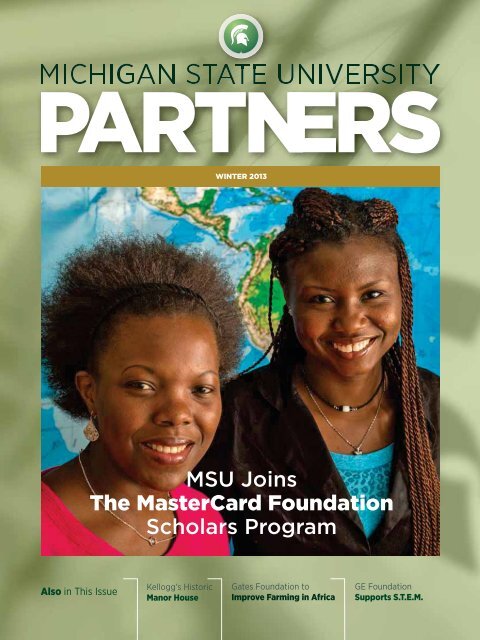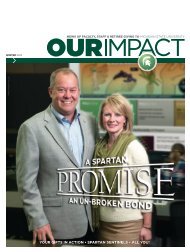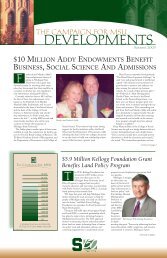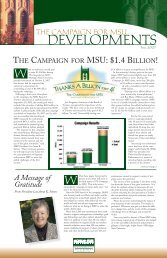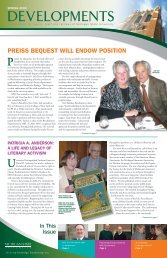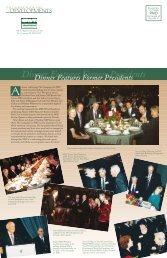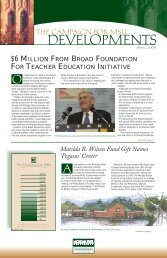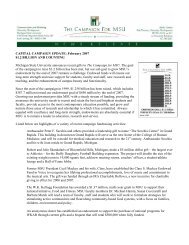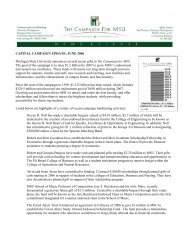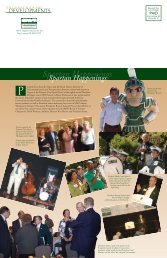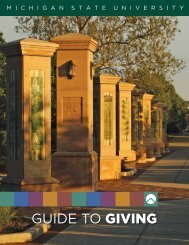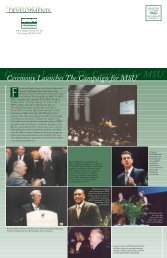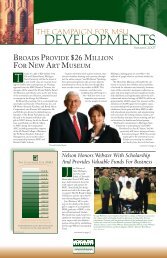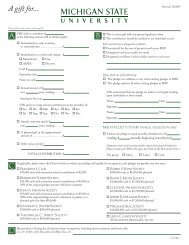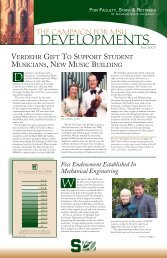Winter 2013 - Giving to MSU - Michigan State University
Winter 2013 - Giving to MSU - Michigan State University
Winter 2013 - Giving to MSU - Michigan State University
Create successful ePaper yourself
Turn your PDF publications into a flip-book with our unique Google optimized e-Paper software.
WINTER <strong>2013</strong><br />
<strong>MSU</strong> Joins<br />
The MasterCard Foundation<br />
Scholars Program<br />
Also in This Issue<br />
Kellogg’s His<strong>to</strong>ric<br />
Manor House<br />
Gates Foundation <strong>to</strong><br />
Improve Farming in Africa<br />
GE Foundation<br />
Supports S.T.E.M.
GLOBALENGAGEMENT<br />
<strong>Michigan</strong> <strong>State</strong> <strong>University</strong><br />
is optimistic about the<br />
future of Africa.<br />
Our urban planners and<br />
demographers show Africa<br />
<strong>to</strong> possess a young, vibrant,<br />
sophisticated and increasingly<br />
urban population. Our<br />
information and communication<br />
technology specialists note<br />
that more than 500 million<br />
Africans now own cell<br />
phones, a transformative<br />
level of digital connectivity.<br />
Our political scientists have<br />
charted the steady spread of<br />
democratic institutions and<br />
the deepening of respect<br />
for transparency and civic<br />
participation. Our agricultural<br />
scientists, climate scientists<br />
and development specialists<br />
note a new atmosphere of<br />
confidence and collaboration as<br />
African leaders cooperate with<br />
neighboring countries, build<br />
new region-wide institutions,<br />
and plot a course of pan-African<br />
development that embraces<br />
the continent. And everywhere<br />
in Africa it is now recognized<br />
that private capital and local<br />
entrepreneurship have a central<br />
role in fostering and sustaining<br />
development. <strong>Michigan</strong> <strong>State</strong><br />
<strong>University</strong> has cultivated the<br />
types of partnerships over<br />
the last 50 years that allow<br />
us <strong>to</strong> participate, analyze<br />
and contribute <strong>to</strong> this unique<br />
his<strong>to</strong>rical moment in Africa.<br />
Among many other Africarelated<br />
initiatives, <strong>MSU</strong> is<br />
currently engaged in an<br />
ambitious education initiative,<br />
efforts <strong>to</strong> improve sustainable<br />
farming methods, and research<br />
on important health issues.<br />
<strong>MSU</strong> and The MasterCard<br />
Foundation Partner on $500 Million<br />
Initiative for African Scholars<br />
With 50-plus years of engagement in Africa,<br />
<strong>Michigan</strong> <strong>State</strong> <strong>University</strong> will partner with The<br />
MasterCard Foundation on its $500 million<br />
education initiative, The MasterCard Foundation<br />
Scholars Program, <strong>to</strong> provide talented, yet economically<br />
disadvantaged youth – especially those from<br />
Africa – with access <strong>to</strong> high-quality education.<br />
<strong>MSU</strong> is the only institution in the Midwest<br />
<strong>to</strong> join the program, which is part of a global<br />
network of institutions. During the nine-year<br />
program, the university will receive $45 million<br />
in funding from the foundation <strong>to</strong> support 100<br />
undergraduates and 85 master’s degree students.<br />
<strong>MSU</strong> welcomed the first cohort of five graduate<br />
and two undergraduate students for the<br />
2012-13 academic year.<br />
“<strong>Michigan</strong> <strong>State</strong> and The MasterCard Foundation<br />
both recognize that Africa is approaching<br />
an important inflection point,” said <strong>MSU</strong><br />
President Lou Anna K. Simon. “Seven African<br />
countries are among the world’s 10 fastestgrowing<br />
economies, and the continent is the<br />
world’s youngest demographically. That offers<br />
remarkable potential for innovation, and The<br />
Scholars Program will add leverage by building<br />
Africa’s educational capacity.”<br />
Simon observed that the region still lags behind<br />
the world in secondary and higher education<br />
completion rates, and in order <strong>to</strong> sustain the continent’s<br />
rapid growth, it’s essential that its young<br />
people have the skills needed <strong>to</strong> participate in a<br />
competitive global economy.<br />
The MasterCard Foundation Scholars Program<br />
offers The Scholars a comprehensive package<br />
of financial, academic and social support, as<br />
well as access <strong>to</strong> networks <strong>to</strong> make successful<br />
transitions <strong>to</strong> further education or the workforce<br />
in Africa, said Reeta Roy, president and CEO of<br />
The MasterCard Foundation. Scholars at <strong>MSU</strong><br />
will build experiences, values and competencies<br />
1 <strong>MSU</strong> Partners <strong>Winter</strong> <strong>2013</strong>
The MasterCard<br />
Foundation<br />
Bill & Melinda<br />
Gates Foundation<br />
that are critical <strong>to</strong> success in the global<br />
economy, enabling them <strong>to</strong> give back <strong>to</strong> their<br />
communities and home countries.<br />
“I want <strong>to</strong> work in the public health sec<strong>to</strong>r<br />
because there are some loopholes and gaps<br />
that need <strong>to</strong> be filled,” said Barbara Kotei, a<br />
MasterCard Foundation Scholar at <strong>MSU</strong>.<br />
“The ideas that I bring <strong>to</strong> the table, the education,<br />
the perseverance and the drive might<br />
help people see these gaps.”<br />
Kotei, from Ghana, is an Honors College<br />
student majoring in biochemistry and hopes<br />
<strong>to</strong> use her education <strong>to</strong> improve Ghana’s<br />
public health system.<br />
“An education does more than liberate<br />
people from poverty; it is the foundation<br />
of social and economic progress,” said Roy,<br />
who announced the program at a United<br />
Nations Special Session in September. “The<br />
MasterCard Foundation Scholars Program<br />
is a network of extraordinary educational<br />
institutions, nongovernmental organizations<br />
and young people. Together, they<br />
will contribute <strong>to</strong> the emergence of a more<br />
equitable, dynamic and prosperous Africa.”<br />
Partners currently involved in The<br />
MasterCard Foundation Scholars Program<br />
include: American <strong>University</strong> of Beirut<br />
– Faculty of Health Sciences; Arizona<br />
<strong>State</strong> <strong>University</strong>; Ashesi <strong>University</strong>; Duke<br />
<strong>University</strong>; EARTH <strong>University</strong>; <strong>MSU</strong>;<br />
Stanford <strong>University</strong>; <strong>University</strong> of California-Berkeley;<br />
and Wellesley College. This<br />
global network of institutions was selected<br />
for their shared values, academic excellence,<br />
Partner Institutions Gather at <strong>MSU</strong><br />
nurturing environment and programs<br />
relevant <strong>to</strong> growth sec<strong>to</strong>rs in Africa, Roy<br />
said. The Program also includes a partnership<br />
with African Leadership Academy <strong>to</strong><br />
develop an African-based careers network<br />
for Scholars <strong>to</strong> access internships and jobs<br />
across the continent.<br />
In Oc<strong>to</strong>ber 2012 the partner institutions joined The MasterCard Foundation for a threeday<br />
conference on the <strong>MSU</strong> campus. With all institutions represented, partners had the<br />
opportunity <strong>to</strong> share experiences, discuss program coordination, and begin developing a<br />
network-wide framework for success of The Scholars Program as it continues <strong>to</strong> grow.<br />
<strong>MSU</strong> will employ a network coordina<strong>to</strong>r <strong>to</strong> organize annual conferences for The Scholars.<br />
In addition, <strong>MSU</strong> will support the creation of The MasterCard Foundation Scholars and<br />
Alumni network, connecting students across the program and building a community of nextgeneration<br />
leaders who are committed <strong>to</strong> service.<br />
With 2,500 African alumni and involvement in projects in at least 32 African nations<br />
during the last 50 years, <strong>MSU</strong> will provide strong support <strong>to</strong> The MasterCard Foundation<br />
Scholars and all African students, Simon said. The university has 24 formal partnerships<br />
with organizations and institutions in Africa. In 1960, <strong>MSU</strong> established an African Studies<br />
Center, which now provides instruction in more than a dozen African languages.<br />
The MasterCard Foundation advances microfinance and youth learning <strong>to</strong> promote financial<br />
inclusion and prosperity. Through collaboration with committed partners in 49 countries, the<br />
foundation is helping people living in poverty <strong>to</strong> access opportunities <strong>to</strong> learn and prosper. An<br />
independent, private foundation based in Toron<strong>to</strong>, Canada, it was established through the generosity<br />
of MasterCard Worldwide at the time of the company’s initial public offering in 2006.<br />
Helping African Nations Improve Sustainable Farming Methods<br />
<strong>Michigan</strong> <strong>State</strong> <strong>University</strong> researchers will use a $7.8 million grant<br />
from the Bill & Melinda Gates Foundation <strong>to</strong> help eight African<br />
nations improve their sustainable farming methods.<br />
The grant, from the Gates Foundation Global Development<br />
Program, will be used <strong>to</strong> help guide policymaking efforts <strong>to</strong> intensify<br />
farming methods that meet agricultural needs while improving environmental<br />
quality in Kenya, Malawi, Mali, Nigeria, Burkina Faso,<br />
Zambia, Ethiopia and Tanzania.<br />
Programs like this are paramount <strong>to</strong> Africa, as demonstrated<br />
by more than $2.5 billion in annual spending by African governments<br />
on agricultural intensification, said Thomas Jayne, project<br />
co-direc<strong>to</strong>r and <strong>MSU</strong> agricultural, food and resource economics<br />
faculty member.<br />
“All of the partners have made a long-term commitment <strong>to</strong> help<br />
this region’s programs reach their full potential,” he said. “<strong>MSU</strong> has<br />
longstanding expertise in this field, and our commitment <strong>to</strong> institution<br />
building was a major reason as <strong>to</strong> why the Gates Foundation put<br />
its trust in <strong>MSU</strong> for this grant.”<br />
During the next four years, the <strong>MSU</strong> team will work with 10 African<br />
universities, institutes and government ministries <strong>to</strong> promote<br />
effective government strategies that help African farmers become<br />
more productive and food secure. The team also will build the capacity<br />
of national policy institutes <strong>to</strong> guide and support agriculture<br />
ministries and eventually accept and manage international grants.<br />
Along with the international partnerships, Jayne will collaborate<br />
with fellow <strong>MSU</strong> researchers from the agricultural, food and resource<br />
economics department, including Melinda Heisey, Lenis Liverpool-<br />
Tasie, Niama Dembele, Isaac Minde, David Mather and Duncan<br />
Bough<strong>to</strong>n. Together, the team will focus on three key crops – maize,<br />
sorghum and rice – and seek <strong>to</strong> improve seed development, fertilization<br />
and crop rotation <strong>to</strong> increase yields in a sustainable manner.<br />
The grant builds upon <strong>MSU</strong>’s longstanding commitment <strong>to</strong> this<br />
region and stands as a tribute <strong>to</strong> the legacy of the <strong>MSU</strong> researchers<br />
who pioneered efforts such as these, Jayne added. In 2008, <strong>MSU</strong><br />
used a $4 million Gates Foundation grant <strong>to</strong> analyze the region’s<br />
agricultural marketing and trade systems <strong>to</strong> provide guidance <strong>to</strong> governments<br />
in the region on strategies <strong>to</strong> raise agricultural productivity<br />
and create more efficient, sustainable markets for small farmers.<br />
“By guiding investments and developing policies, we’re hoping <strong>to</strong><br />
create benefits that go beyond the direct recipients,” Jayne said. “The<br />
ripple effect could provide insights that feed more broadly in<strong>to</strong> improving<br />
the policy processes in other countries in the region.”<br />
giving<strong>to</strong>.msu.edu 2
Dana Foundation<br />
USAID<br />
Uncovering How Cerebral<br />
Malaria Damages the Brain<br />
Michael Potchen,<br />
associate professor in<br />
the Department of<br />
Radiology.<br />
Building on a quarter century of work<br />
in Malawi, a <strong>Michigan</strong> <strong>State</strong> <strong>University</strong><br />
researcher is traveling <strong>to</strong> neighboring<br />
Zambia <strong>to</strong> perform MRI scans on<br />
children newly diagnosed with cerebral<br />
malaria in hopes of unlocking how it<br />
damages the brain.<br />
Michael Potchen, an associate professor<br />
in the Department of Radiology, has been<br />
awarded a three-year, $200,000 grant<br />
from the Dana Foundation, a private<br />
philanthropic organization supporting<br />
brain research through grants and public<br />
education. He is seeking <strong>to</strong> validate the findings of the Malawi<br />
MRI Research Team, which he leads with Terrie Taylor of <strong>MSU</strong>’s<br />
College of Osteopathic Medicine.<br />
Cerebral malaria affects more than three million children annually,<br />
primarily in sub-Saharan African nations such as Zambia and<br />
Malawi, Potchen said. Although drugs can quickly clear the malariacausing<br />
parasite from children, up <strong>to</strong> 25 percent of those infected<br />
will die and almost one-third of survivors suffer long-term neurological<br />
problems, including epilepsy and behavioral problems.<br />
“Even with millions of children being affected, we do not know<br />
how malaria damages the brain throughout the course of illness,<br />
especially in its earliest stages when therapeutic interventions<br />
might be most effective,” he said. “While we have discovered very<br />
unique findings in Malawi during au<strong>to</strong>psies of children and using<br />
an MRI, those results cannot fully be verified using the Malawi<br />
MRI, which has a lower field strength and is therefore somewhat<br />
limited.”<br />
Using an MRI at the Cancer Disease Hospital in Zambia that<br />
is four times stronger than the machine used in Malawi, Potchen<br />
and his team will seek <strong>to</strong> validate initial evidence about how the<br />
disease damages the brain and produces epilepsy, behavioral disorders<br />
and severe cognitive and mo<strong>to</strong>r disabilities.<br />
They will scan children, specifically looking at brain hemorrhaging,<br />
ischemia (lack of blood) in certain areas of the brain,<br />
whether the blood/brain barrier is intact and the severity of<br />
cerebral swelling.<br />
“If confirmed, the findings will change the clinical care of cerebral<br />
malaria,” said Potchen, who spends about four months each year in<br />
Africa. “This could lead <strong>to</strong> significant new approaches <strong>to</strong> prevent the<br />
disease or minimize its destructive effects in the brain.”<br />
Members of the <strong>MSU</strong> team have spent time in Zambia over the<br />
last year training local physicians and house officers in ways more<br />
accurately <strong>to</strong> classify patients with cerebral malaria. They also<br />
worked with the radiology department <strong>to</strong> be prepared <strong>to</strong> start the<br />
project at the onset of the malaria season, which began in December.<br />
Taylor, who has been working in Malawi since the 1980s and<br />
spends six months each year there studying cerebral malaria, said<br />
<strong>MSU</strong>’s collaborative approach in the region is crucial <strong>to</strong> making<br />
progress.<br />
“The results <strong>to</strong> date from the Malawi MRI have greatly enhanced<br />
our understanding of how malaria wreaks havoc in the brains of<br />
patients with cerebral malaria,” she said. “Dr. Potchen’s project<br />
represents an excellent opportunity <strong>to</strong> expand upon the Malawi<br />
findings.”<br />
Potchen said this particular project is bridging much of the work<br />
done by <strong>MSU</strong> researchers in Malawi and Zambia. “Not only are we<br />
cooperating on work done by our staff, but this gives us the chance<br />
<strong>to</strong> build relationships among the health care communities in both<br />
nations on projects that are vital <strong>to</strong> both countries,” he said.<br />
For more information on <strong>MSU</strong>’s work in Africa, go <strong>to</strong><br />
http://special.news.msu.edu/africa/<br />
For more information on the Dana Foundation, go <strong>to</strong><br />
http://www.dana.org/<br />
USAID Taps <strong>MSU</strong> <strong>to</strong> Lead Global Food Efforts<br />
With a grant of up <strong>to</strong> $25 million from<br />
U.S. Agency for International Development<br />
(USAID), <strong>MSU</strong> is working <strong>to</strong> improve<br />
agricultural production and reduce<br />
poverty in areas of the world suffering from<br />
rapid urbanization, population growth and<br />
skills gaps. Finding solutions <strong>to</strong> the problems<br />
that affect global food production is<br />
the focus of <strong>MSU</strong>’s new Global Center for<br />
Food Systems Innovation (GCFSI). The<br />
center is part of USAID’s Higher Education<br />
Solutions Network – a partnership<br />
with seven American and foreign universities<br />
designed <strong>to</strong> develop solutions <strong>to</strong> global<br />
development challenges.<br />
“By collaborating with <strong>to</strong>p universities<br />
around the world, we hope <strong>to</strong> tap <strong>to</strong>day’s<br />
brightest minds and focus ingenuity on<br />
global development challenges,” said USAID<br />
Administra<strong>to</strong>r Rajiv Shah. “With the right<br />
ideas, we can reduce extreme poverty by more<br />
than 60 percent in just one generation.”<br />
<strong>MSU</strong> is widely recognized for its<br />
leadership in global food production and<br />
food safety and its work with partners<br />
across Africa. With another recent<br />
USAID grant of $7.3 million, <strong>MSU</strong><br />
will lead a program <strong>to</strong> cultivate the<br />
next generation of African and Asian<br />
agricultural scientists. A first cohort of<br />
30 master’s and ten doc<strong>to</strong>ral candidates<br />
will matriculate at agricultural research<br />
institutions in Fall <strong>2013</strong>.<br />
3 <strong>MSU</strong> Partners <strong>Winter</strong> <strong>2013</strong>
FOCUSONS.T.E.M.<br />
GE Foundation<br />
Science, Technology,<br />
Engineering, Math<br />
(S.T.E.M.)<br />
education takes<br />
many forms at <strong>MSU</strong>.<br />
<strong>MSU</strong> is engaged at<br />
all levels in efforts<br />
<strong>to</strong> improve S.T.E.M.<br />
education in <strong>Michigan</strong><br />
and the United <strong>State</strong>s<br />
with pipeline projects for<br />
urban educa<strong>to</strong>rs, worldclass<br />
research, enrichment<br />
programs <strong>to</strong> support<br />
students in math, science<br />
and engineering and a <strong>to</strong>p<br />
tier College of Education<br />
whose graduate programs<br />
in elementary and<br />
secondary education have<br />
ranked first in the nation<br />
for 18 years in a row.<br />
GE Foundation<br />
Supports<br />
Expansion<br />
of Common<br />
Core Math<br />
Standards<br />
Research<br />
The GE Foundation is supporting <strong>Michigan</strong><br />
<strong>State</strong> <strong>University</strong> researchers as they study a major<br />
effort <strong>to</strong> improve mathematics education – the<br />
implementation of new common standards. <strong>University</strong><br />
Distinguished Professor William Schmidt<br />
will use a $1 million grant from the GE Foundation<br />
<strong>to</strong> expand his research on the Common Core<br />
<strong>State</strong> Standards for Mathematics (CCSSM). With<br />
a second grant ($800,000) from the GE Foundation,<br />
<strong>MSU</strong> experts will assist teachers in aligning<br />
instruction <strong>to</strong> the CCSSM.<br />
Known for his global research on math instruction,<br />
Schmidt forged a partnership with the two<br />
organizations that led the development of the<br />
standards, the Council of Chief <strong>State</strong> School<br />
Officers and the National Governor’s Association.<br />
The CCSSM were released in 2010 and have been<br />
adopted by 46 states. Previously, Schmidt and his<br />
team conducted surveys of school district curriculum<br />
direc<strong>to</strong>rs, teachers, parents and students in<br />
the states that had officially adopted the CCSSM.<br />
They identified three potential impediments <strong>to</strong><br />
the successful implementation of the Common<br />
Core: textbooks, teachers and leadership.<br />
Schmidt says merely adopting more rigorous<br />
standards such as the Common Core will not<br />
likely change much unless the new standards<br />
are implemented appropriately. The research<br />
supported by the GE Foundation is designed <strong>to</strong><br />
provide states, districts and teachers the <strong>to</strong>ols they<br />
need <strong>to</strong> make the new standards a success.<br />
Quality, world-class standards are a first step in<br />
providing rigorous and demanding opportunities<br />
<strong>to</strong> our nation’s children. Teachers must translate<br />
the new standards in<strong>to</strong> classroom experiences for<br />
students. One major challenge is that the most<br />
widely used textbooks are poorly aligned with<br />
the CCSSM and there is little evidence that the<br />
right kind of textbooks will be released in the near<br />
future, placing a substantial burden on teachers<br />
and administra<strong>to</strong>rs <strong>to</strong> restructure their curricula.<br />
Another challenge is that most U.S. teachers have<br />
not had the background in mathematics from<br />
their teacher preparation programs <strong>to</strong> be able<br />
effectively <strong>to</strong> teach the more rigorous content<br />
included in the Common Core, especially during<br />
the middle grades. The results of the Teacher<br />
Education Study in Mathematics (TEDS-M) in<br />
the U.S. and the Promoting Rigorous Outcomes<br />
in Mathematics/Science Education (PROM/SE)<br />
project, both led by Schmidt, suggest that professional<br />
development alone is unlikely <strong>to</strong> remediate<br />
this gap, and given its great expense, might not be<br />
the best use of resources. The third challenge <strong>to</strong><br />
effective implementation of the CCSSM involves<br />
the leadership required from state, district and<br />
especially school-level administra<strong>to</strong>rs in order<br />
<strong>to</strong> shepherd the vast array of changes needed <strong>to</strong><br />
improve the system of mathematics instruction.<br />
The next phase of Schmidt’s research will include:<br />
continued development of a virtual system<br />
for textbook analysis and classroom Common<br />
Core implementation; a follow-up of the future<br />
teachers who participated in the TEDS-M project<br />
and are now teaching; surveys of district curriculum<br />
personnel, teachers and parents about<br />
the Common Core; and the ongoing study of<br />
states’ implementation of the CCSSM. Schmidt<br />
and his team have had extensive experience in<br />
the design and execution of major research projects<br />
investigating mathematics and science education.<br />
Their work has yielded numerous articles<br />
and several books including Why Schools Matter,<br />
Teacher Education Matters and Schmidt’s most<br />
recent book, Inequality for All.<br />
4
DTE Energy Foundation<br />
Dart Foundation<br />
DTE Energy Foundation Funds Engineering<br />
and Science Summer Academy<br />
For the third consecutive year, in 2012<br />
the DTE Energy Foundation provided a<br />
$50,000 grant <strong>to</strong> support <strong>Michigan</strong> <strong>State</strong><br />
<strong>University</strong>’s Engineering and Science<br />
Summer Academy (ESSA), a six-week residential<br />
program initiated in 2007 by the<br />
College of Engineering Diversity Programs<br />
Office (DPO).<br />
ESSA is designed <strong>to</strong> help incoming freshmen<br />
make an easier transition from high<br />
school <strong>to</strong> college, positioning them <strong>to</strong> be<br />
academically successful once fall semester<br />
classes begin.<br />
“Through the generosity of the DTE<br />
Energy Foundation, we are able <strong>to</strong> provide<br />
housing for the ESSA program,” said Theodore<br />
Caldwell, DPO direc<strong>to</strong>r. “Without<br />
housing, we would not be able <strong>to</strong> have an<br />
ESSA; this support makes all the difference.<br />
We are extremely grateful for our<br />
partnership with the DTE Energy Foundation<br />
and look forward <strong>to</strong> continuing this<br />
relationship.”<br />
“Programs such as ESSA help <strong>to</strong> prepare<br />
the pool of diverse engineering candidates <strong>to</strong><br />
meet the demands of the competitive workplace,”<br />
said Karla Hall, vice president of the<br />
foundation. “We consider the grant an investment<br />
in our state’s future energy leaders.”<br />
ESSA, which targets those deemed most<br />
at-risk, admits 20 students each summer. The<br />
selection criteria include a challenging interview<br />
process and several written assessments.<br />
Caldwell describes ESSA as an “academic<br />
boot camp” that “puts freshmen through<br />
their paces.” One participant said after completing<br />
ESSA, “If I could survive ESSA, I can<br />
certainly survive a regular college semester!”<br />
“We believe that ESSA has already made a<br />
positive impact on retention in the College<br />
of Engineering,” said Caldwell. “We are<br />
confident that it will continue <strong>to</strong> do so.”<br />
Each summer, ESSA participants attend<br />
daily classes in math, writing, and chemistry,<br />
and participate in “chalk talks” by engineering<br />
faculty, staff, and graduate students;<br />
these informal presentations aim <strong>to</strong> connect<br />
students with these various groups and<br />
expose them <strong>to</strong> all engineering disciplines<br />
early on. ESSA students also participate in<br />
living-learning programs and activities designed<br />
<strong>to</strong> get students acquainted with the<br />
environmental and social aspects of college.<br />
ESSA is the first component in a yearlong<br />
retention strategy called the Diversity<br />
Programs Office Scholars Program (DPO-<br />
SP). The DPO-SP requirements include participation<br />
in ESSA, enrollment in specified<br />
math and engineering courses, bi-weekly<br />
meetings with DPO staff, and participation<br />
in a men<strong>to</strong>ring program that matches each<br />
incoming student with a third- or fourthyear<br />
engineering student.<br />
Students who successfully complete the<br />
year-long DPO-SP program receive a $1,000<br />
scholarship, funded by <strong>MSU</strong>’s Office of Inclusion<br />
and Intercultural Initiatives and the<br />
College of Engineering dean, and placement<br />
in a research assistantship the summer after<br />
their first year on campus.<br />
DPO services include a guided learning<br />
center, advising, peer men<strong>to</strong>ring, and special<br />
seminars for professional development, as<br />
well as assistance with scholarships and internships.<br />
The DPO remains committed <strong>to</strong><br />
increasing the recruitment and retention of<br />
a diverse student body, encouraging a greater<br />
understanding of national and international<br />
diversity <strong>to</strong> meet the needs of a multicultural<br />
and global society, and improving the<br />
climate for underrepresented students.<br />
The DTE Energy Foundation is the<br />
philanthropic arm of DTE Energy, continuing<br />
the legacy of community support and<br />
involvement of its principal operating subsidiaries,<br />
Detroit Edison and MichCon.<br />
For more information, visit<br />
dteenergy.com/foundation.<br />
Dart Foundation Supports <strong>Michigan</strong> Science<br />
Olympiad <strong>State</strong> Tournament<br />
The Dart Foundation continues its longstanding support for<br />
<strong>Michigan</strong> Science Olympiad (MSO) and the <strong>State</strong> Tournament<br />
Competition and Awards Program at <strong>Michigan</strong> <strong>State</strong> <strong>University</strong><br />
with a three-year $165,000 grant for 2012-2015.<br />
Science Olympiad is an international nonprofit organization<br />
devoted <strong>to</strong> improving the quality of science education, increasing<br />
student interest in science, and providing recognition for outstanding<br />
achievement in science education by both students and teachers.<br />
5 <strong>MSU</strong> Partners <strong>Winter</strong> <strong>2013</strong>
Dart Foundation<br />
The first Science Olympiad National Tournament was held at<br />
<strong>Michigan</strong> <strong>State</strong> <strong>University</strong> in 1985. <strong>MSU</strong> has hosted the <strong>State</strong><br />
Tournament and Awards Program each year since 1990. Beginning<br />
in 2004, the Dart Foundation has provided generous support for<br />
the state event. The most recent grant boosts their participation <strong>to</strong><br />
nearly a dozen years.<br />
The Office of the Associate Provost for <strong>University</strong> Outreach and<br />
Engagement (UOE) encourages all <strong>MSU</strong> colleges <strong>to</strong> engage in the<br />
Science Olympiad effort <strong>to</strong> offer activities that broaden the experience<br />
for pre-college students.<br />
“The Dart Foundation is a key partner in the success of the<br />
<strong>Michigan</strong> Science Olympiad <strong>State</strong> Tournament,” said Hiram E.<br />
Fitzgerald, associate provost for <strong>University</strong> Outreach and Engagement,<br />
and <strong>University</strong> Distinguished Professor. “Their involvement<br />
bolsters our ability <strong>to</strong> utilize university resources <strong>to</strong> the best of our<br />
ability. The grant assures adequate financial support for planning,<br />
delivering and evaluating a well-run competition designed <strong>to</strong><br />
support the efforts of <strong>Michigan</strong>’s schools <strong>to</strong> stimulate interest in<br />
science among <strong>Michigan</strong> school-age children.”<br />
More than 450 high school and middle school teams engage in<br />
regional competitions during February and March, resulting in<br />
96 teams selected <strong>to</strong> compete at the state <strong>to</strong>urnament. With 15<br />
students per team, joined by teachers, coaches, parents, grandparents<br />
and volunteers, the state <strong>to</strong>urnament regularly brings nearly 3,000<br />
individuals <strong>to</strong> campus for the annual April event.<br />
The Science Olympiad program features inquiry and hands-on<br />
learning. The activities do not have known answers that can be<br />
memorized, instead they rely on exploration, invention, ingenuity<br />
and experimentation – fundamentals of the scientific process<br />
that influence critical skills necessary for life-long learning. All<br />
events require teamwork, group planning, and cooperation. The<br />
emphasis is on learning, participation, interaction, having fun<br />
and developing team spirit.<br />
“No matter where the student teams finish in the Science<br />
Olympiad competitions, the individual participants gain from<br />
the experience. These young men and women are involved in the<br />
application of highly developed scientific concepts and processes,<br />
they engage in collaborative activities, they utilize their creativity,<br />
they represent their schools in academic competition, and most<br />
importantly, they see possible futures for themselves in science,<br />
math, engineering and technology,” said Claudia Deschaine,<br />
grants manager for the Dart Foundation. “We are delighted<br />
<strong>to</strong> partner with <strong>MSU</strong> and the <strong>Michigan</strong> Science Olympiad on<br />
the state <strong>to</strong>urnament because it is aimed at developing scientific<br />
exploration and discovery in budding learners. Ultimately, we<br />
are achieving a workforce of capable individuals who can develop<br />
solutions for many of society’s great challenges.”<br />
<strong>MSU</strong>’s large, contiguous campus and scientific facilities are ideally<br />
suited for the scale of the competition. East Lansing’s relatively<br />
central location in the state and the university’s longevity as the<br />
<strong>to</strong>urnament host add accessibility and stability that participating<br />
teams value. Event estimates include more than 2,000 hours of<br />
volunteer time by <strong>MSU</strong> faculty, scientists, researchers, graduate and<br />
undergraduate students, and professional staff.<br />
Many high school students who participate on <strong>Michigan</strong> Science<br />
Olympiad teams enter the college selection process with a highly<br />
favorable view of <strong>MSU</strong>’s faculty, students, scientific resources and<br />
the university‘s land-grant mission <strong>to</strong> discover practical uses for<br />
theoretical knowledge.<br />
“This is a well-designed program that is preparing future<br />
leaders <strong>to</strong> participate in a competitive, global economy that<br />
needs skills in science, technology, engineering and math for<br />
21 st century jobs,” said Fitzgerald. “We value the Dart Foundation’s<br />
sustained support of these efforts, and we are grateful they share our<br />
vision for this unique statewide educational partnership with the<br />
<strong>Michigan</strong> Science Olympiad.”<br />
“The Dart Foundation<br />
grant advances our<br />
efforts <strong>to</strong> recognize<br />
the outstanding<br />
achievements of both<br />
students and teachers<br />
in the areas of science,<br />
math, engineering and<br />
technology.”<br />
--Hiram E. Fitz gerald,<br />
Associate Provost for <strong>University</strong><br />
Outreach and Engagement<br />
giving<strong>to</strong>.msu.edu 6
MOVINGMICHIGANFORWARD<br />
Kellogg Founder’s Summer<br />
Estate Receives Endowment<br />
A $1 million endowment gift <strong>to</strong> <strong>Michigan</strong><br />
<strong>State</strong> <strong>University</strong> from the W.K. Kellogg<br />
Foundation ensures that the Kellogg Manor<br />
House and Estate in Hickory Corners,<br />
<strong>Michigan</strong>, will be maintained in perpetuity.<br />
The endowment also supports internships<br />
for <strong>MSU</strong> students. Interns will undertake<br />
projects <strong>to</strong> enhance the property and will<br />
help develop programs that showcase the<br />
his<strong>to</strong>ry of the estate and the s<strong>to</strong>ry of W.K.<br />
Kellogg, founder of the Kellogg Company<br />
and the W.K. Kellogg Foundation.<br />
“This gift ensures that the Kellogg Manor<br />
House will remain in excellent condition<br />
<strong>to</strong> be enjoyed by future generations,” said<br />
<strong>MSU</strong> President Lou Anna K. Simon. “We<br />
are profoundly grateful for the ongoing<br />
partnership and generosity of the W.K. Kellogg<br />
Foundation.”<br />
“We are glad <strong>to</strong> provide a way <strong>to</strong> enhance<br />
the educational experiences for students<br />
of <strong>Michigan</strong> <strong>State</strong> <strong>University</strong> and Kellogg<br />
Biological Station, while at the same time<br />
preserving the legacy of the W.K. Kellogg<br />
family,” added James McHale, W.K. Kellogg<br />
Foundation vice president of program<br />
strategy.<br />
The Kellogg Foundation deeded the<br />
property <strong>to</strong> <strong>MSU</strong> in 1952 for use in<br />
conjunction with the Kellogg Biological<br />
Station (KBS). KBS is <strong>MSU</strong>’s largest<br />
research center, and in addition <strong>to</strong> the<br />
Academic Center, includes the Kellogg<br />
Bird Sanctuary, Kellogg Experimental<br />
Farm, as well as the Manor House and<br />
Conference Center at Gull Lake. KBS<br />
faculty develop programs in research,<br />
education and outreach focusing on<br />
understanding the ecological and evolutionary<br />
processes in natural and managed<br />
ecosystems and how this can be applied <strong>to</strong><br />
the conservation of natural resources and<br />
sustainable agricultural practices. Local<br />
school groups and teachers are frequent<br />
visi<strong>to</strong>rs <strong>to</strong> all of the KBS facilities, where<br />
lessons in basic science are imparted by<br />
highly qualified faculty, graduate students<br />
and technical staff.<br />
7 <strong>MSU</strong> Partners <strong>Winter</strong> <strong>2013</strong>
W.K. Kellogg Foundation<br />
Baldwin Foundation<br />
W.K. Kellogg and his wife, Dr. Carrie<br />
Staines Kellogg, built the Manor House<br />
in 1925-26 and used it as a summer home<br />
until the early 1940s. In 1942, the Kelloggs<br />
offered the property for use by the<br />
United <strong>State</strong>s military. The U.S. Coast<br />
Guard used the estate for induction and<br />
training; more than 3,000 active duty<br />
personnel passed through during the war.<br />
Later the home served as a rehabilitation<br />
unit for Percy Jones Hospital in Battle<br />
Creek. For the next decade, the house<br />
accommodated medical personnel and<br />
servicemen wounded in World War II.<br />
In 1999 a $3.5 million grant from the<br />
foundation allowed <strong>MSU</strong> <strong>to</strong> res<strong>to</strong>re the<br />
Manor House and Estate <strong>to</strong> their original<br />
grandeur. The res<strong>to</strong>ration project brought<br />
the his<strong>to</strong>rical building up <strong>to</strong> modern<br />
code, which involved extensive repair and<br />
replacement both inside and out, and refurnished<br />
the Manor House with replicas<br />
of furniture that matched the originals. In<br />
the ensuing 12 years since the res<strong>to</strong>ration<br />
was completed, the Manor House and<br />
Estate have become a popular attraction<br />
in the Battle Creek-Kalamazoo area. Each<br />
year, about 8,000 people visit the Manor<br />
House for <strong>to</strong>urs, school outings, lectures<br />
by visiting scholars, special events, business<br />
and professional meetings, weddings<br />
and celebrations.<br />
“The Kellogg Manor House and Estate<br />
provide a unique opportunity <strong>to</strong> fulfill<br />
the mission of KBS by providing an<br />
entry point for the public <strong>to</strong> the research<br />
and educational programs being done at<br />
KBS,” said Kay Gross, KBS direc<strong>to</strong>r, adding<br />
that <strong>MSU</strong> will work <strong>to</strong> leverage the<br />
foundation’s grant <strong>to</strong> raise an additional<br />
$500,000, bringing the <strong>to</strong>tal endowment<br />
fund <strong>to</strong> $1.5 million.<br />
The W.K. Kellogg Foundation<br />
(WKKF), founded in 1930 as an independent,<br />
private foundation by breakfast cereal<br />
pioneer Will Keith Kellogg, is among<br />
the largest philanthropic foundations in<br />
the United <strong>State</strong>s. Guided by the belief<br />
that all children should have an equal opportunity<br />
<strong>to</strong> thrive, WKKF works with<br />
communities <strong>to</strong> create conditions for vulnerable<br />
children so they can realize their<br />
full potential in school, work and life.<br />
The Kellogg Foundation is based in<br />
Battle Creek, <strong>Michigan</strong>, and works<br />
throughout the United <strong>State</strong>s and internationally,<br />
as well as with sovereign tribes.<br />
Special emphasis is paid <strong>to</strong> priority places<br />
where there are high concentrations of<br />
poverty and where children face significant<br />
barriers <strong>to</strong> success. WKKF priority<br />
places in the U.S. are in <strong>Michigan</strong>, Mississippi,<br />
New Mexico and New Orleans; and<br />
internationally, are in Mexico and Haiti.<br />
For more information,<br />
visit www.wkkf.org.<br />
Students with Autism Disorders<br />
Get Strong Support from Baldwin Foundation<br />
For students with autism or Asperger’s Syndrome, it can be<br />
overwhelming <strong>to</strong> try <strong>to</strong> connect with peers and professors or<br />
take advantage of resources <strong>to</strong> aid their success. But thanks <strong>to</strong><br />
an initiative – Building Opportunities for Networking and Discovery<br />
(BOND) – opportunities for social and communication<br />
development are expanding at <strong>MSU</strong>. BOND was established<br />
in 2010 following a personal gift from Julie Mulnix Wolf. Ms.<br />
Mulnix Wolf serves on the board of the Baldwin Foundation,<br />
which in 2012 approved a five-year $65,000 grant <strong>to</strong> support the<br />
BOND initiative.<br />
Established in 1968, the Baldwin Foundation is a family foundation<br />
that primarily supports education, social services and the arts in<br />
Western <strong>Michigan</strong>. Since 1977, <strong>MSU</strong>’s two medical schools plus its<br />
Alumni Distinguished Scholars Program and Resource Center for<br />
Persons with Disabilities (RCPD) have been helped by foundation<br />
grants.<br />
BOND benefits students with autism spectrum disorders and<br />
enables the university <strong>to</strong> welcome and engage them more fully.<br />
When the program began, it served around 25 students, but that<br />
number has nearly doubled. Autism spectrum disorders are a<br />
group of developmental disabilities that affect significant social,<br />
communication and behavioral skills. Designed <strong>to</strong> mitigate<br />
such obstacles, the BOND program aims <strong>to</strong> enhance social and<br />
coping skills, connect students sharing similar challenges, build<br />
self-esteem and create a safe supportive environment in which<br />
<strong>to</strong> pursue opportunities. For instance, experiential learning provides<br />
a safe, comfortable environment <strong>to</strong> practice interpersonal<br />
skills.<br />
Other facets of the program include individualized curriculum<br />
programming and service learning. The foundation’s grant will<br />
help expand the program, based on participant and coordina<strong>to</strong>r<br />
feedback, <strong>to</strong> include outreach facilitation and mutual men<strong>to</strong>ring.<br />
Assistive technology is increasingly used <strong>to</strong> improve time<br />
management and build interpersonal skills.<br />
Ms. Mulnix Wolf, whose grandson has autism, is a passionate<br />
BOND advocate. “The BOND Program and the RCPD team<br />
are spectacular in what they do with what they have <strong>to</strong> work<br />
with,” she said. “They are innovative, they are hard-working, and<br />
they put things <strong>to</strong>gether so well that I feel blessed <strong>to</strong> even be part<br />
of their work by association.”<br />
The program has also made a lasting impact on its students.<br />
As one student explained: “Inclusive programs sponsored by the<br />
RCPD such as BOND made a world of difference <strong>to</strong> me during<br />
my freshman year. I can only imagine the benefits of a campuswide<br />
social outreach that aims <strong>to</strong> make everyone feel at home at<br />
East Lansing, truly proud <strong>to</strong> be a Spartan.”<br />
giving<strong>to</strong>.msu.edu 8
Bill & Melinda Gates Foundation<br />
W.K. Kellogg Foundation<br />
Social Media Research<br />
<strong>to</strong> Help Teens Get Ready for College<br />
A <strong>Michigan</strong> <strong>State</strong> <strong>University</strong> researcher<br />
plans <strong>to</strong> help U.S. teens get better access<br />
<strong>to</strong> college by connecting them with social<br />
resources already at their fingertips:<br />
Facebook friends.<br />
The College Connect app will help<br />
identify people within a user’s Facebook<br />
network who are likely <strong>to</strong> be valuable<br />
sources of college-related information, such<br />
as those who list an alma mater on their<br />
profile or like a university’s Facebook page.<br />
Christine Greenhow, assistant professor<br />
in the <strong>MSU</strong> College of Education, will<br />
develop the app with colleagues at the<br />
<strong>University</strong> of <strong>Michigan</strong> and the <strong>University</strong><br />
of Oxford. They’ll use a $100,000 grant<br />
from the College Knowledge Challenge,<br />
a competitive grant initiative funded by<br />
the Bill & Melinda Gates Foundation and<br />
administered by College Summit, Inc.<br />
The contest is focused on creating new<br />
Facebook apps for education that make the<br />
college-going process more transparent,<br />
collaborative and easy <strong>to</strong> navigate for all<br />
students, but especially for low-income and<br />
first-generation students. Greenhow’s team<br />
was one of 21 winners worldwide.<br />
“Today’s teenagers are Facebooking in<br />
their free time,” Greenhow said. “Our app<br />
will leverage the power of Facebook <strong>to</strong><br />
address a persistent educational problem,<br />
that kids from upper-income families are<br />
10 times more likely <strong>to</strong> get a four-year<br />
college degree than kids from low-income<br />
families. This app could help all students<br />
learn about college.”<br />
While some students may not have close<br />
friends or immediate family members<br />
with knowledge about obtaining a fouryear<br />
degree, College Connect could help<br />
them find Facebook friends of whom they<br />
would be more likely <strong>to</strong> ask questions<br />
about college experiences or particular<br />
institutions. The app will display a visual<br />
network of Facebook friends with various<br />
types of college affiliations, creating a<br />
pathway for identifying useful connections<br />
and sources of information.<br />
Free online apps exist that produce<br />
visualizations of Facebook networks, but<br />
this will be the first <strong>to</strong> address college<br />
access issues. It expands a social network<br />
program developed at Oxford.<br />
Greenhow is working with Nicole<br />
Ellison, associate professor in the School of<br />
Information at U-M, and Bernard Hogan,<br />
research fellow at the Oxford Internet<br />
Institute. The researchers are partnering<br />
with national college-access organizations<br />
such as College Possible, as well as school<br />
districts serving high percentages of lowincome<br />
and underrepresented students.<br />
Christine Greenhow,<br />
assistant professor<br />
in the College<br />
of Education<br />
Kellogg Foundation<br />
Endows Leadership Program<br />
In 2012 the W.K. Kellogg Foundation continued its<br />
longstanding partnership with <strong>Michigan</strong> <strong>State</strong> <strong>University</strong><br />
through a $250,000 grant <strong>to</strong> endow the Great Lakes Leadership<br />
Academy (GLLA).<br />
GLLA got its start in 2004 with the aid of a planning grant from<br />
the Kellogg Foundation. GLLA’s mission is <strong>to</strong> promote positive<br />
change, economic vitality and resource conservation and <strong>to</strong><br />
enhance the quality of life in <strong>Michigan</strong> by encouraging leadership<br />
for the common good. Administered through the <strong>MSU</strong> College<br />
of Agriculture and Natural Resources, <strong>MSU</strong> Extension and the<br />
<strong>Michigan</strong> Agricultural Experiment Station, the academy offers<br />
leadership training for stakeholders across <strong>Michigan</strong>.<br />
GLLA offers an Emerging Leader Program and a Leadership<br />
Advancement Program for leaders from a range of backgrounds<br />
representing key stakeholders in <strong>Michigan</strong>. Participants deepen<br />
their understanding of sustainability issues and engage in<br />
hands-on team experiences. The programs open opportunities<br />
for network building, while participants engage in developing<br />
leadership skills as they gain perspective about critical issues<br />
facing communities, food systems and agriculture, natural<br />
resources and environment, and business and manufacturing<br />
sec<strong>to</strong>rs in <strong>Michigan</strong>. The Kellogg Foundation endowment grant<br />
provides operational and program support for the academy.<br />
9 <strong>MSU</strong> Partners <strong>Winter</strong> <strong>2013</strong>
PARTNERPROGRESS<br />
Opened in November 2012, Broad Art Museum<br />
has drawn tens of thousands of visi<strong>to</strong>rs <strong>to</strong> the <strong>MSU</strong> campus <strong>to</strong> explore<br />
the Zaha Hadid-designed building and view the traveling exhibits<br />
by contemporary artists alongside pieces from the university’s own<br />
collection. The Broad Foundations and Eli and Edythe Broad were<br />
the lead donors <strong>to</strong> the museum.<br />
Alan Mulally, president and CEO of Ford Mo<strong>to</strong>r<br />
Company, interacts with students from <strong>MSU</strong>’s Broad College of<br />
Business and College of Engineering following his address <strong>to</strong> a packed<br />
audi<strong>to</strong>rium during “Ford Day on Campus.” Recruiting teams from<br />
the company were also on hand throughout the day <strong>to</strong> meet with<br />
<strong>MSU</strong> students.<br />
The P&G Leadership<br />
Lounge in the Eppley<br />
Center (Broad College of<br />
Business) was officially opened on<br />
September 12, 2012. Procter &<br />
Gamble was represented at the<br />
ribbon-cutting by Peter J. Wojda,<br />
Jr. (5th from left, holding scissors).<br />
Wojda is associate direc<strong>to</strong>r, Beauty<br />
& Grooming Product Supply,<br />
Procter & Gamble Company, and<br />
a graduate of <strong>MSU</strong>’s College of<br />
Engineering. The Eli and Edythe<br />
L. Broad Dean, Stefanie Lenway,<br />
is holding the other half of the<br />
scissors.<br />
giving<strong>to</strong>.msu.edu 10
<strong>MSU</strong> PARTNERS<br />
<strong>University</strong> Development<br />
Spartan Way<br />
535 Chestnut Rd., Room 300<br />
East Lansing, MI 48824<br />
Non-Profit Org.<br />
U.S. Postage<br />
PAID<br />
E. Lansing, MI<br />
Permit #21<br />
<strong>MSU</strong> Partners is published by:<br />
Corporate & Foundation Relations<br />
<strong>University</strong> Development<br />
<strong>Michigan</strong> <strong>State</strong> <strong>University</strong><br />
Spartan Way<br />
535 Chestnut Road, Room 300<br />
East Lansing, MI 48824<br />
Lou Anna K. Simon, President<br />
<strong>Michigan</strong> <strong>State</strong> <strong>University</strong><br />
Robert W. Groves, Vice President<br />
<strong>University</strong> Advancement<br />
Alisa Healy, Edi<strong>to</strong>r<br />
(517) 884-1019<br />
Lucille Fallon, Direc<strong>to</strong>r<br />
Corporate & Foundation Relations<br />
Tim Wuchter, Associate Direc<strong>to</strong>r<br />
Foundation Relations<br />
Kyan Zeller, Associate Direc<strong>to</strong>r<br />
Corporate Relations<br />
Larry Wallach, Associate Direc<strong>to</strong>r<br />
Corporate & Foundation Relations<br />
Brad Ricker, Associate Direc<strong>to</strong>r<br />
Corporate Relations, Key Industries<br />
Pam Serwa, Development Officer<br />
Corporate & Foundation Relations, Southeast <strong>Michigan</strong><br />
Uniquely Ours<br />
$65.9<br />
million invested<br />
in <strong>MSU</strong> (2011-12)<br />
by corporations,<br />
foundations,<br />
associations<br />
and groups.<br />
Achievement<br />
The Dart Foundation<br />
grant supports the<br />
Science Olympiad <strong>to</strong><br />
advance <strong>MSU</strong>’s efforts <strong>to</strong><br />
recognize outstanding<br />
achievements of<br />
1,500+<br />
students & teachers<br />
each year.<br />
Global Focus<br />
The MasterCard<br />
Foundation is<br />
investing in<br />
185<br />
African scholars<br />
<strong>to</strong> attend <strong>MSU</strong>.


